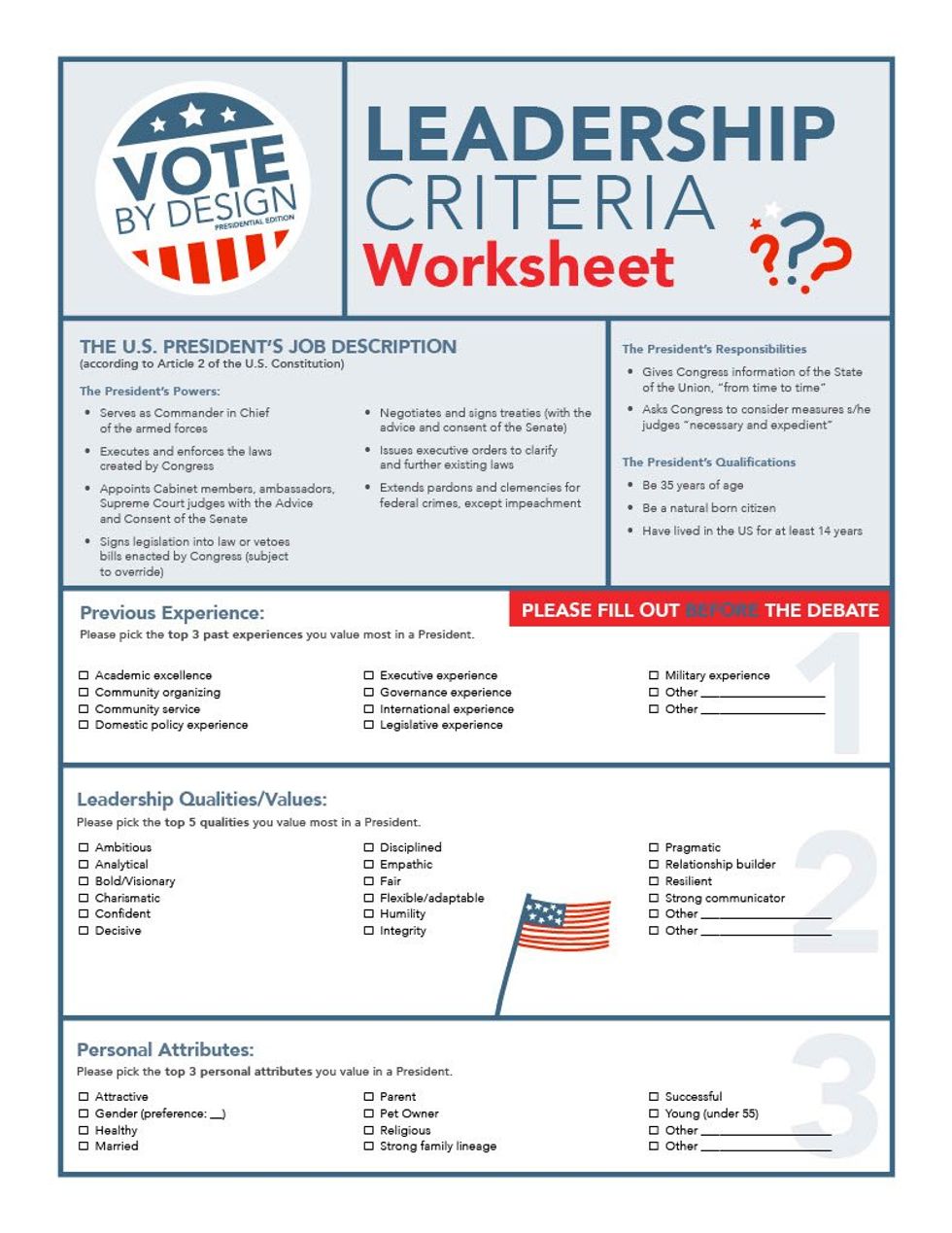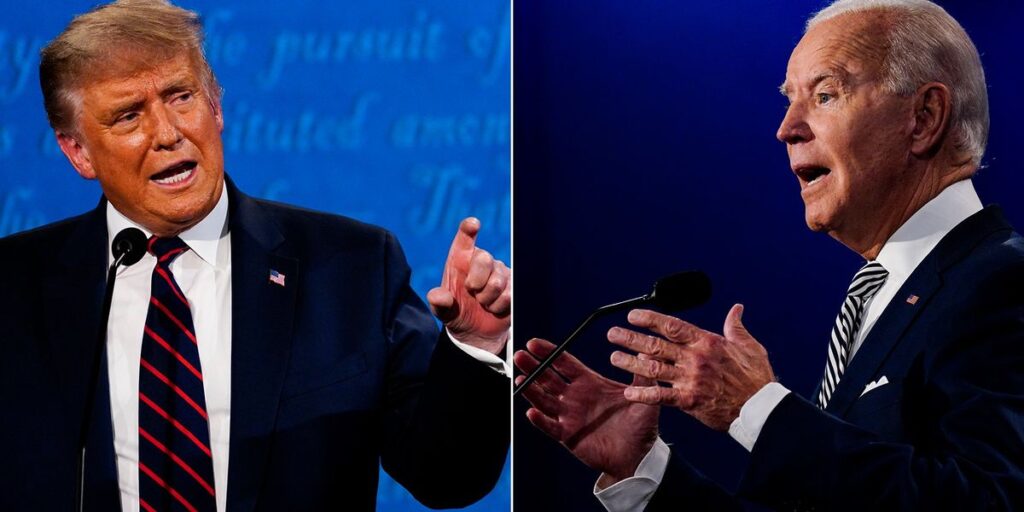Solomon is a faculty member at Stanford University's School of Design and founder of the Civic Futures Program, which includes: Vote by designand the development of American teammates. team.
The first 2024 presidential debate will be held on Thursday. It will be the earliest presidential debate ever and, given the intensity of partisanship, it could be the ugliest and most negative one in history, setting the stage for a longer, more heated exchange of blame and name-calling.
Over the past four years, I have been on a mission to amplify the power of our voices and our votes in innovative and experiential ways. I have created citizen-centered programs and fellowships. Student Athletes, A gathering for advocates of democracy and Robust Toolkit To show future generations that democracy is not something that happens, but something that can be shaped through informed engagement and, of course, voting.
As we approach a defining moment in the 2024 campaign, I've been thinking a lot about how we can view this debate not as political theater or a rhetorical boxing match, but as an opportunity to think more deeply about leadership.
This unlikely journey to becoming a “citizen futurist” began in 2019, in the run-up to the 2020 election, when I partnered with several other scenario planning experts and design strategists to devise a new approach to voter education and engagement. As futurists, we were concerned about the growing number of harmful patterns and effects from the 2016 election and wanted to devise a new, non-partisan, empirical methodology that put voters at the center, rather than campaigns, political parties, lobbying groups, or political pundits. Vote by designwas developed as a pop-up class and piloted. Stanford University d.school.
Sign up for The Fulcrum newsletter
At the heart of the Vote by Design experience was a simple reconfiguration: instead of asking, “Who will you vote for?” we asked, “What leadership qualities do you believe are essential for a president?” It was a subtle shift, but one that had a big impact.
We made all of our materials fun, accessible, and engaging. Our work has won awards globally and inspired thousands of the next generation of voters through our partnerships with schools, civic organizations, and digital education platforms. We were especially excited when Doris Kearns Goodwin, award-winning historian and renowned presidential biographer, gave us permission to host her. Share a clip from the President's Master Class on Leadership As part of a lesson plan.
So, ahead of this year’s historic debate on Thursday, we wanted to revisit our methodology and core visual assets that put into practice the principles of critical thinking, active listening and deliberative reflection.
How do you get started with this approach? Let's take a closer look:
1. Start with leadership qualities (not the candidate).
Before the debate begins, write down the qualities you think a president needs. It could be anything from honesty and empathy to decisiveness and diplomatic skills. There are no right or wrong answers here; it's all about what you value. Voting by Design Leadership Standards Worksheet What we've created is a tool to help you highlight potential qualities and explore which ones you feel are most important. As you watch the debates, look beyond policy positions (although those are important too) and pay attention to how the candidates embody leadership. How do they handle tough questions? How do they express their vision for the country? Do they embody the leadership qualities you've identified?

2. Envision future scenarios that will require presidential leadership.
One of the most effective elements of our Vote by Design program is Imagine possible scenarios These are scenarios that call for presidential leadership. How would each candidate handle a natural disaster or international crisis? In 2019, we actually created a scenario with a global pandemic as its theme, and another with a riot (in our scenario, it was a riot at a state capital, not a national insurrection). We didn't intend to predict the future, but we hoped to prompt fresh consideration of how their leadership qualities would play out in a pressured situation. What scenarios can you imagine unfolding over the next four years or more? What type of leadership do we need now?
3. Listen and evaluate the evidence beyond the hype.
Look beyond the pre-rehearsed talking points and intended social media “flattery.” We all know politicians come in prepared with short phrases, but what did their words and rhetoric convey about the person behind the hyperbole? What core values or enduring qualities did each candidate demonstrate? How did they align with the priorities that matter most to you? This may require some independent thinking, especially if loud, opinionated voices dominate your news feed and immediate community.
4. Reflect on what you've learned.
After the debate, take some time to reflect. Did the candidates demonstrate the qualities you found important? Can you imagine giving a speech at a future international conference with other world leaders, or in a State of the Union address? Did your perception change over the course of the debate? Reflection like this, even in just a few quiet minutes, can be extremely revealing.
Debates aren't about “winning and losing” or creating the most talked-about TikTok moment. Rather, they give us the opportunity to gather more data to evaluate the best candidate for the job. As one student noted after a Vote by Design workshop, “Identifying my values up front made a difference in how each candidate presented themselves as the future leader of our country.”
This approach encourages us to think more holistically about presidential leadership. It's not about who has the best “gotcha” or who produces the best fodder for social media influencers. Rather, the debates offer us a new opportunity to observe and consider who has what it takes to lead effectively in a complex and unpredictable world.
This approach also empowers us as voters: rather than feeling like we are simply reacting to campaign messages and media reports, we are actively engaged in a thoughtful evaluation process. We are not simply selecting a candidate, we are defining what good leadership means to us.
As we head into another election season, I can't help but wonder: How would our political debate change if more people adopted this approach? Would it lead to a more nuanced, substantive conversation about leadership? Would it help bridge the gap that seems insurmountable in our current political climate?
While I don't have all the answers, I remain hopeful about the possibilities, based on the learning and growth I've witnessed firsthand by taking a voter-centered approach. So as you prepare for Thursday's debate, I encourage you to try this method out. You might be surprised by what you discover about the candidates, about the president, or even about yourself.
From an article on your site
Related articles from around the web

